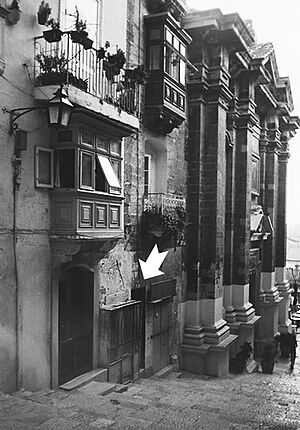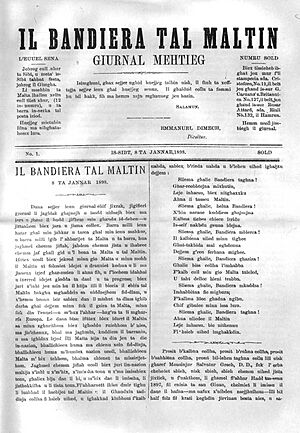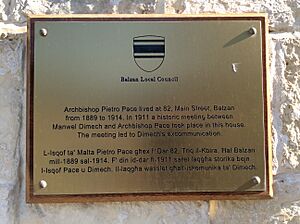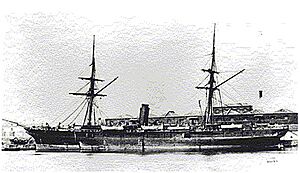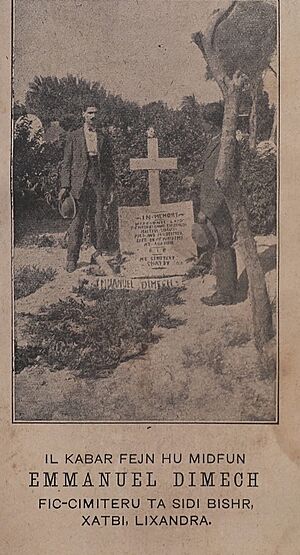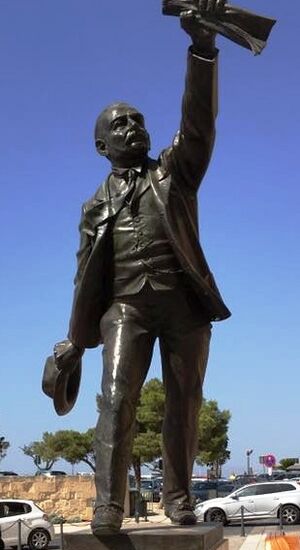Manwel Dimech facts for kids
Quick facts for kids
Manwel Dimech
|
|
|---|---|
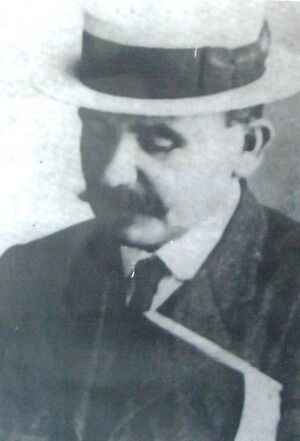
Manwel Dimech in 1911
|
|
| Born | 25 December 1860 |
| Died | 17 April 1921 (aged 60) Victoria College, Alexandria, Egypt.
|
| Resting place | Buried in an unmarked grave within the grounds of Victoria College, Alexandria, Egypt |
| Monuments | Castille Place, Valletta, by Anton Agius, inaugurated on May 1, 1976. |
| Occupation | Social reformer, philosopher, journalist, author and poet |
| Years active | 1898-1914 |
| Organization | Ix-Xirka tal-Imdawlin (Society of the Enlightened) |
| Known for | Social reform |
|
Notable work
|
Il-Bandiera tal-Maltin, Ivan u Prascovia, Aphorisms |
| Spouse(s) | Virginia née Agius (1872-1938); married: Stella Maris, Sliema, October 2, 1900 |
| Children | Manuel (1902-1902) Attilio (1903-1918) |
| Parent(s) | Karmenu Dimech (1836-1874) x Evangelista née Zammit (1831-1900); married: St Paul Shipwreck, Valletta, October 2, 1855 |
| Signature | |
Manwel Dimech (born December 25, 1860 – died April 17, 1921) was a Maltese social reformer, philosopher, journalist, writer, and poet. He was born in Valletta and grew up in a very poor family. Dimech spent a lot of his early life in prison. While there, he taught himself to read and write, becoming a very smart person.
After leaving prison, Dimech became a teacher and publisher. He became well-known in Malta for speaking out about social problems. Many people supported his ideas. However, his views caused problems with both the Catholic Church and the British government ruling Malta. Because of his growing popularity, the Governor of Malta sent him away to Sicily, Italy. Dimech later moved to British-controlled Egypt. Despite efforts from important British officials, he was not allowed to return to Malta. He passed away in Egypt in 1921.
Contents
Early Life in Malta
Manwel Dimech was born on Christmas Day, December 25, 1860, in St John Street, Valletta, Malta. He was baptized at the church of St Paul Shipwreck. His family was very poor and lived in a single room in a crowded building.
His family moved twice during his childhood, first to Qormi (now Santa Venera) and then to Msida. His father worked hard but was often sick and died when Manwel was only 13. This left his mother to care for their ten young children.
Learning in Prison
When he was 13, Dimech got into trouble and was sent to prison. He had no education or guidance at the time. This first experience did not stop him from getting into more trouble later. He was sent to prison several more times.
While in prison, Dimech started to learn how to read and write. This was in 1877, when he was 17 years old. With a lot of time on his hands, he became a very keen reader. He studied many subjects like literature, grammar, politics, history, philosophy, and religion.
Mastering Languages
Dimech discovered he was very good at learning languages. In prison, he became fluent in Maltese, English, French, and Italian. He later used these skills to earn a living by teaching languages. He was very smart and interested in politics, especially in understanding why poverty and social unfairness existed. All this learning helped him greatly when he became a public figure.
Dimech's Philosophy
Dimech believed in a philosophy he called 'of action'. This idea is similar to Pragmatism, which was popular in the United States around the same time. He learned from philosophers like Jeremy Bentham and John Stuart Mill.
He thought that actions are right or wrong based on how well they work in real life. He believed that knowledge gives power to act. Also, he felt that actions should aim to bring happiness, first for individuals, and then for everyone in the community.
Becoming a Public Figure
After being released from prison in 1897, Dimech started an important public career. In 1898, he began publishing a weekly newspaper in Maltese called Il-Bandiera tal-Maltin (The Flag of the Maltese). This newspaper became his main way to share his ideas.
Through his newspaper, he wrote about the social structure of Malta. He also suggested ways for Malta to improve. He strongly believed in educating ordinary people. He even bravely suggested that Malta could one day become an independent country that could support itself economically.
His Publications
Dimech published many things during his life. The 462 issues of Il-Bandiera tal-Maltin are the most famous. He also published other newspapers in different languages, two novels, and grammar books in Italian, English, French, and Maltese. Sadly, his poetry books have not survived.
Dimech's main goal with his publications was to help ordinary people, especially young men and women who couldn't get an education. He loved the Maltese language and saw it as a powerful tool to help people gain freedom and improve their lives.
Travels Abroad
In 1903, Dimech traveled to Montenegro to study its social and political situation. He also visited northern Italy twice, spending almost four years there. In Italy, he learned a lot about workers' movements and trade unions. He was also very interested in how the government and the church worked together. When he returned to Malta, he was full of energy and ready to bring about social changes.
His Main Goals
Dimech strongly wanted to change the social system in Malta. His main goal was to fix the unfairness caused by the colonial government, the Catholic Church, the wealthy class, and landowners. He planned to start by educating a new group of people from the community. Then, he hoped to reach the uneducated and poor masses. His ultimate aim was to make Malta an industrial country that could support itself and eventually govern itself.
Organizing People
When Dimech returned to Malta from Italy in 1911, he started an organization called Ix-Xirka ta' l-Imdawlin (The League of the Enlightened). This was like a modern union, a social club, a group fighting for workers' rights, an adult education school, and a political party all in one.
Through this league, Dimech hoped to have a strong influence on politics, society, and even religion. Young people who wanted change, from all social classes, joined him. Dimech's "revolution" had begun.
Facing Challenges
Dimech quickly faced opposition. The powerful Catholic Church condemned his newspaper and his organization. Soon after, they even removed Dimech from the Church (called excommunication). This was a huge blow in Malta in the 1910s, but Dimech did not give up.
He continued to fight back with the limited freedom he had. For a whole year, from 1911 to 1912, he and his family were treated very badly by the Church. But he remained strong. Finally, the Church ended his excommunication on December 1, 1912.
Dimech had won against many difficulties. He immediately restarted his organization, calling it Ix-Xirka tal-Maltin (The League of the Maltese).
Seen as a Threat
The Catholic Church was not the only group unhappy with Dimech. The British colonial government was also worried about his growing influence among workers at the Maltese shipyards. Many of Dimech's supporters came from there. This threatened to disrupt Malta's use as a major naval base for the British in the Mediterranean.
Just over a year after he restarted his Xirka tal-Maltin, Dimech was arrested. The First World War had just started. Malta's colonial governor accepted an accusation that Dimech was a spy for Germany. He was secretly sent away to Sicily, in Italy. There, he was arrested again and told to leave for any country he chose, except Malta. Dimech chose Egypt, which was under British control.
Soon after, he was arrested again, this time for good. For the rest of his life, seven long and difficult years, Dimech lived in prisons or camps in Alexandria or Cairo.
His Exile
At some point, the British started to consider Dimech a "prisoner of war". However, even after the First World War ended in 1918, he was not released. He remained in exile until he died. Many requests for him to return to Malta were refused by the colonial government. Even important British officials like Edmund Allenby and Winston Churchill asked for his return, but it was denied.
Death in Exile
In late 1918, Dimech was moved to a camp in Sidi Bishr in Alexandria, Egypt. The harsh prison conditions quickly made his health worse. In November 1920, after becoming partly paralyzed, he was moved to Victoria College, Alexandria. This college had been turned into a hospital because of the war.
But it was too late for Dimech. He died in Alexandria on April 17, 1921. He was buried without a ceremony in the sandy grounds of Victoria College, Alexandria. His grave was not marked, and no one has been able to find it since.
Dimech's Followers
A small group of Dimech's young followers continued to be active in Malta even after he was sent away in 1914. They organized Malta's first recorded strike at the Royal shipyards in 1920. Some of them also played a big part in the Sette Giugno riots. These riots led to Malta getting its first self-government constitution in 1921.
Remembering Manwel Dimech
Manwel Dimech's story was brought back to public attention in the 1960s and 1970s. This led to new interest in his life. In the 1970s, the socialist Prime Minister, Dom Mintoff, made Dimech a symbol for socialist ideas.
Dimech's fame was finally set. In 1972, some Maltese pound coins were made with his name and picture. In 1976, a monument to him was built in front of the Prime Minister's office in Valletta, in one of Malta's main squares. In 2004, Dr Mark Montebello published an important book called Dimech, which gave a more balanced view of his life.
In 2012, new writings by Dimech were found from his last three years in exile. These included a large work in English with thousands of short sayings (aphorisms), fables, and poems. This work was published in 2012 as Aphorisms: Wisdom of a philosopher in exile.
In April 2013, Karl Fiorini composed a musical piece called 'Sinfonietta Pro Populo'. It was based on the 'Innu Malti' (the Maltese Hymn) written by Dimech. The Malta Philharmonic Orchestra performed this symphony.
In June 2014, Henry Frendo published more unknown writings by Dimech from the early 1880s, when Dimech was still in prison. The book, Dimech's Lost Prison Poems, contains poems and letters Dimech received while in prison.
National Recognition
As a sign of national respect, on November 10, 2012, the President of Malta, George Abela, unveiled a plaque in St John Street, Valletta. This plaque marks Dimech's birthplace. On September 5, 2014, exactly 100 years after Dimech's exile began, the President of Malta, Marie Louise Coleiro Preca, unveiled another plaque near the Customs house at Valletta. This plaque marks the place from where Dimech was sent into exile.
In 2021, a musical about his life was written and performed at Kordin prison, where Dimech spent many years.
Manwel Dimech Foundation
In April 2019, it was announced that a foundation would be created in Dimech's name. It was stated that the foundation would be "dedicated to the ideals of Dimech," but more details have not yet been shared.
Places Named After Dimech
- Manwel Dimech Street, in Għaxaq; Qormi; Rabat, Gozo; San Ġiljan; Sliema
- Manwel Dimech Bridge, in San Ġiljan
See also
- Philosophy in Malta
 | Kyle Baker |
 | Joseph Yoakum |
 | Laura Wheeler Waring |
 | Henry Ossawa Tanner |


